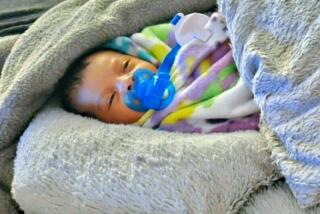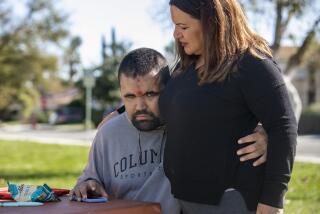Spotting, and Stopping, Abuse
- Share via
In the fantasy world of television drama, the signs of child abuse are usually obvious. Emergency room doctors are confronted by guilty-looking parents and children with blackened eyes, broken bones and bruised skin. Beyond caring for the children’s medical needs, it’s always clear what the doctors must do next--call the police.
Unfortunately, in the real world--though doctors are required by law to call the police when they suspect child abuse--the signs are not always so straightforward. Is it child abuse when an 18-month-old is spanked sharply for crying during a diaper change? Is it abuse when a 5-year-old girl is left home alone all day? When an 8-year-old boy doing poorly in school is called “stupid” and “worthless” by his parents?
The laws governing child welfare provide few absolute answers to those questions. However, child welfare authorities do follow some general guidelines, of which everyone should be aware. The simplest is that any bodily injury inflicted on a child (excluding those that result from an accident) can constitute physical abuse. The injury does not have to be severe to qualify--even a small bruise or cut can be enough.
Although controversial, spanking a child (particularly on the buttocks) is not considered abuse unless it is done so forcefully that it results in an injury or observable sign of trauma (such as a bruise, welt or redness on the skin). Of course, sexual activities with a child, including molestation, indecent exposure, fondling and rape, are abusive.
Many people assume that physical acts like hitting and punching must be involved before a child can be considered “abused.” In fact, emotional abuse can be just as damaging, and the law recognizes this fact. Emotional abuse can include isolating a child from normal contact with peers or other members of the family; purposefully and continually embarrassing, belittling or ridiculing a child; or routinely threatening the child with physical harm.
Neglect is another form of child mistreatment. It occurs not when something bad is done to a child, but rather when something that should be done isn’t. Failing to provide a child with adequate food, clothing or shelter, for example, qualifies as neglect, even if the child is fortunate enough to be unharmed by that treatment.
So, when is a doctor--or a concerned friend or neighbor--obligated to call the authorities? And, even if not required by law, when is it the right thing to do for the child’s sake?
Reporting is appropriate whenever there is a “reasonable suspicion” that a child has been, or is in danger of, abuse or neglect. (Reasonable suspicion means that, given the same information, most people would suspect abuse.)
Alerting the authorities is the best way to get the abusive treatment stopped quickly. The earlier it is done, the more likely a child is to escape serous physical and emotional injury. Early reporting also helps break the cycle of abuse; children who are abused for long periods are more likely to abuse their own children.
Unfortunately, many (if not most) cases of child abuse and neglect go unreported--even though they are suspected. Some people fail to report suspected abuse because they fear it will cause more trouble for the child or the child’s family. Others worry about revenge should their role in reporting be discovered or should they be required to testify in court.
While understandable, such concerns are largely unfounded. Most reports of abuse do not result in the child being removed from the home. (One of the goals of intervention is to identify the homes where it is safe to let a child remain.) Only when children’s ongoing safety or welfare is in question do authorities remove them from their home, placing them temporarily with relatives or in foster care or a group home. During that time, social workers try to improve the home setting sufficiently to allow the child to return. Only after extensive efforts have failed is permanent placement in foster care considered.
People who report good-faith suspicions of child abuse are legally protected from both civil and criminal liability, and cannot be prosecuted unless it is proved that the report was false, and known to be false at the time it was made. Suspicions of child abuse or neglect also can be reported on an anonymous basis.
To report suspicions of child abuse or neglect, contact the Los Angeles Child Abuse Hotline at (800) 540-4000 (from within California). The hotline operates 24 hours a day, seven days a week.
In the next Our Health: Recognizing emotional abuse.
*
Dr. Valerie Ulene is a board-certified specialist in preventive medicine practicing in Los Angeles. The column appears the second and fourth Mondays. E-mail questions to [email protected]. She cannot respond to every query.


